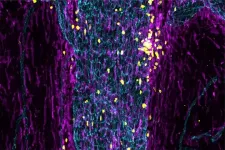Examining oncology clinical trials launched before, during COVID-19 pandemic
2021-01-27
(Press-News.org) What The Study Did:
Researchers evaluated the association between the pandemic and clinical research and development by studying the initiation of oncology clinical trials over time.
Authors:
Elizabeth B. Lamont, M.D., M.S., M.MSc., of Acorn AI by Medidata, a Dassault Systèmes Company, in Boston, is the corresponding author.
To access the embargoed study:
Visit our For The Media website at this link
https://media.jamanetwork.com/
(doi:10.1001/jamanetworkopen.2020.36353)
Editor's Note: The article includes conflict of interest disclosures. Please see the article for additional information, including other authors, author contributions and affiliations, conflict of interest and financial disclosures, and funding and support.
INFORMATION:
Media advisory:
The full study is linked to this news release.
Embed this link to provide your readers free access to the full-text article
This link will be live at the embargo time
http://jamanetwork.com/journals/jamanetworkopen/fullarticle/10.1001/jamanetworkopen.2020.36353?utm_source=For_The_Media&utm_medium=referral&utm_campaign=ftm_links&utm_term=012721
About JAMA Network Open: JAMA Network Open is the new online-only open access general medical journal from the JAMA Network. On weekdays, the journal publishes peer-reviewed clinical research and commentary in more than 40 medical and health subject areas. Every article is free online from the day of publication.
ELSE PRESS RELEASES FROM THIS DATE:
2021-01-27
New findings on the brain and inner ear cavity of a 400-million-year-old platypus-like fish cast light on the evolution of modern jawed vertebrates, according to a study led by Dr. ZHU Youan and Dr. LU Jing from the Institute of Vertebrate Paleontology and Paleoanthropology (IVPP) of the Chinese Academy of Sciences.
The study was published in Current Biology on Jan 27.
Back in 1960s, Paleontologist Dr. Gavin C. Young found several fossils of a long-beaked fish, a type of placoderm, in the Burrinjuck limestones in Australia. He named the fish Brindabellaspis stensioi, and other people jokingly dubbed it "platypus fish" because of its long ...
2021-01-27
Alzheimer's disease, multiple sclerosis, autism, schizophrenia and many other neurological and psychiatric conditions have been linked to inflammation in the brain. There's growing evidence that immune cells and molecules play a key role in normal brain development and function as well. But at the core of the burgeoning field of neuroimmunology lies a mystery: How does the immune system even know what's happening in the brain? Generations of students have been taught that the brain is immunoprivileged, meaning the immune system largely steers clear of it.
Now, researchers at Washington University School of Medicine in St. Louis believe they have figured out how the immune system keeps tabs on what's going on in the brain. Immune ...
2021-01-27
What makes cancer cells different from ordinary cells in our bodies? Can these differences be used to strike at them and paralyze their activity? This basic question has bothered cancer researchers since the mid-19th century. The search for unique characteristics of cancer cells is a building block of modern cancer research. A new study led by researchers from Tel Aviv University shows, for the first time, how an abnormal number of chromosomes (aneuploidy) -- a unique characteristic of cancer cells that researchers have known about for decades -- could become a weak ...
2021-01-27
Biologists believe they are one step closer to a long-held goal of making a cheap, widely available plant a source for energy and fuel, meaning one of the next big weapons in the battle against climate change may be able to trace its roots to the side of a Texas highway.
Researchers at The University of Texas at Austin, HudsonAlpha Institute for Biotechnology, the U.S. Department of Energy (DOE) and other institutions have published a complex genome analysis of switchgrass, a promising biofuel crop.
The team tied different genes to better performance in varying climates across North America, which now gives scientists a road map for breeding ...
2021-01-27
A high proportion of survivors of Ebola experienced a resurgence in antibody levels nearly a year after recovery, a new University of Liverpool study has found.
Published today in Nature, the finding hints that hidden reservoirs of virus could exist long after symptoms ease and has implications for monitoring programmes and vaccine strategies.
When a person is infected with Ebola virus, their body produces antibodies to fight the disease. Antibody concentrations peak and then decline slowly over time, providing the body with some degree of immune protection ...
2021-01-27
Researchers have discovered a novel and druggable insulin inhibitory receptor, named inceptor. The latest study from Helmholtz Zentrum Muenchen, the Technical University of Munich and the German Center for Diabetes Research is a significant milestone for diabetes research as the scientific community celebrates 100 years of insulin and 50 years of insulin receptor discovery. The blocking of inceptor function leads to an increased sensitisation of the insulin signaling pathway in pancreatic beta cells. This might allow protection and regeneration of beta cells for diabetes remission.
Diabetes mellitus is a complex disease characterized by the loss or dysfunction of insulin-producing beta cells in the islets of Langerhans, ...
2021-01-27
Linking molecular components through amide bonds is one of the most important reactions in research and the chemical industry. In the journal Angewandte Chemie, scientists have now introduced a new type of reaction for making amide bonds. Called an ASHA ligation, this reaction is fast, efficient, works under mild aqueous conditions, and is broadly applicable.
Amide bonds are the bond between a carbonyl carbon (C=O) and an organic nitrogen atom. It is amide bonds that link individual amino acids together into proteins and bind monomers into polyamide plastics like perlon ...
2021-01-27
Researchers at Vanderbilt University Medical Center (VUMC) and the University of Texas Medical Branch (UTMB) at Galveston have discovered what may be the Achilles' heel of the coronavirus, a finding that may help close the door on COVID-19 and possibly head off future pandemics.
The coronavirus is an RNA virus that has, in its enzymatic toolkit, a "proofreading" exoribonuclease, called nsp14-ExoN, which can correct errors in the RNA sequence that occur during replication, when copies of the virus are generated.
Using cutting-edge technologies and novel bioinformatics approaches, the researchers discovered that this ExoN also regulates the rate of recombination, the ability of the coronavirus ...
2021-01-27
Reaching zero net emissions of carbon dioxide from energy and industry by 2050 can be accomplished by rebuilding U.S. energy infrastructure to run primarily on renewable energy, at a net cost of about $1 per person per day, according to new research published by the Department of Energy's Lawrence Berkeley National Laboratory (Berkeley Lab), the University of San Francisco (USF), and the consulting firm Evolved Energy Research.
The researchers created a detailed model of the entire U.S. energy and industrial system to produce the first detailed, peer-reviewed study of how to achieve carbon-neutrality by 2050. According to the Intergovernmental Panel on Climate Change (IPCC), the world must reach zero net CO2 ...
2021-01-27
CHAMPAIGN, Ill. -- Culture, civic-mindedness and privacy concerns influence how willing people are to share personal location information to help stem the transmission of COVID-19 in their communities, a new study finds. Such sharing includes giving public health authorities access to their geographic information via data gathered from phone calls, mobile apps, credit card purchases, wristband trackers or other technologies.
Reported in the International Journal of Geo-Information, the study will help public health officials better tailor their COVID-19 mitigation strategies to specific cultural contexts, the ...
LAST 30 PRESS RELEASES:
[Press-News.org] Examining oncology clinical trials launched before, during COVID-19 pandemic







